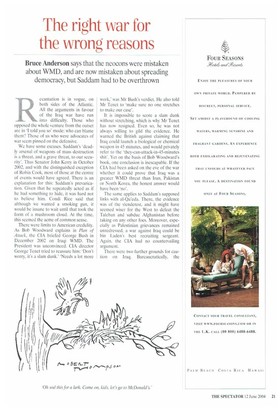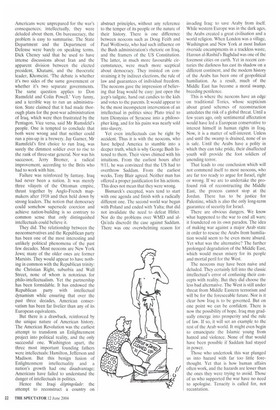The right war for the wrong reasons
Bruce Anderson says that the neocons were mistaken about WMD, and are now mistaken about spreading democracy, but Saddam had to be overthrown
Recantation is in vogue, on both sides of the Atlantic. All the arguments in favour of the Iraq war have run into difficulty. Those who opposed the whole venture from the outset are in 'I told you so' mode: who can blame them? Those of us who were advocates of war seem pinned on the defensive.
We have some excuses. Saddam's 'deadly arsenal of weapons of mass destruction is a threat, and a grave threat, to our securit■,,', Thus Senator John Kerry in October 2002. and with the distinguished exception of Robin Cook, most of those at the centre of events would have agreed. There is an explanation for this: Saddam's prevarication. Given that he repeatedly acted as if he had something to hide, it was hard not to believe him. Condi Rice said that although we wanted a smoking gun, it would be insane to wait until that took the form of a mushroom cloud. At the time, this seemed the acme of common sense.
There were limits to American credulity. As Bob Woodward explains in Plan of Attack, the CIA briefed George Bush in December 2002 on Iraqi WMD. The President was unconvinced. CIA director George Tenet tried to reassure him: 'Don't worry, it's a slam dunk.' Needs a lot more work,' was Mr Bush's verdict. He also told Mr Tenet to 'make sure no one stretches to make our case'.
It is impossible to score a slam dunk without stretching, which is why Mr Tenet has now resigned. Even so, he was not always willing to gild the evidence. He warned the British against claiming that Iraq could launch a biological or chemical weapon in 45 minutes, and would privately refer to the 'they-can-attack-in-45-minutes shit'. Yet on the basis of Bob Woodward's book, one conclusion is inescapable. If the CIA had been asked on the eve of the war whether it could prove that Iraq was a greater WMD threat than Iran, Pakistan or North Korea, the honest answer would have been 'no'.
The same applies to Saddam's supposed links with al-Qa'eda. There, the evidence was of the slenderest, and it might have seemed wiser for the West to defeat the Taleban and subdue Afghanistan before taking on any other foes. Moreover, especially as Palestinian grievances remained unrcdressed, a war against Iraq could be bin Laden's best recruiting sergeant. Again, the CIA had no countervailing argument.
There were two further grounds for caution on Iraq. Bureaucratically, the Americans were unprepared for the war's consequences; intellectually, they were deluded about them. On bureaucracy, the problem is easy to summarise. The State Department and the Department of Defense were barely on speaking terms. Dick Cheney said that he used to have intense discussions about Iran and the apparent division between the elected president, Khatami, and the theocratic leader, Khomeini. 'The debate is whether it's two sides of the same government or whether it's two separate governments. The same question applies to Don Rumsfeld and Colin Powell.' Very funny, and a terrible way to run an administration. State claimed that it had made thorough plans for the post-war administration of Iraq, which were then frustrated by the Pentagon. Vice versa, said Mr Rumsfeld's people. One is tempted to conclude that both were wrong and that neither could run a piss-up in a brewery. Jay Garner, Mr Rumsfeld's first choice to run Iraq, was surely the dimmest soldier ever to rise to the rank of three-star general. Nor was his successor, Jerry Bremer, a radical improvement, according to the Brits who had to work with him.
Failure was reinforced by fantasy. Iraq had never been a nation. It was merely three vilayets of the Ottoman empire, thrust together by Anglo-French mapmakers after 1918 and then held down by strong leaders. The notion that democracy could somehow supersede coercion and achieve nation-building is so contrary to common sense that only distinguished intellectuals could believe it.
They did. The relationship between the neoconservatives and the Republican party has been one of the most interesting and unlikely political phenomena of the past few decades. Most neocons are New York Jews; many of the older ones are former Marxists. They would appear to have nothing in common with the Republican trinity: the Christian Right, suburbia and Wall Street, none of whom is notorious for philo-intellectualism. Yet the partnership has been formidable. It has endowed the Republican party with intellectual dynamism while ensuring that over the past three decades, American conservatism has been far livelier than any of its European equivalents.
But there is a drawback, reinforced by the unique nature of American history. The American Revolution was the earliest attempt to transform an Enlightenment project into political reality, and the only successful one. Washington apart, the three most important founding fathers were intellectuals: Hamilton, Jefferson and Madison. But this benign fusion of Enlightenment intellectuality and a nation's growth had one disadvantage; Americans have failed to understand the danger of intellectuals in politics.
Hence the Iraqi degringolade: the attempt to reconstruct a country on
abstract principles, without any reference to the temper of its people or the nature of their history. There is one difference between neocons such as Doug Feith and Paul Wolfowitz, who had such influence on the Bush administration's rhetoric on Iraq, and the framers of the US Constitution. The latter, in much more favourable circumstances, were much more sceptical about democracy. They insisted on constraining it by indirect elections, the rule of law and guarantees of individual freedom. The neocons gave the impression of believing that Iraq would be easy: just open the jeep's tailgate, hand out candies to the kids and votes to the parents. It would appear to be the most incompetent intervention of an intellectual in politics since Plato tried to turn Dionysius of Syracuse into a philosopher king, and for his pains was nearly sold into slavery.
Yet even intellectuals can be right by accident. Thus it is with the neocons, who have helped America to stumble into a deeper truth, which is why George Bush listened to them. Their views chimed with his intuitions. From the earliest hours after 9/11, he was convinced that the US had to overthrow Saddam. From the earliest weeks, Tony Blair agreed. Neither man has offered a proper justification for his actions. This does not mean that they were wrong.
Bismarck's excepted, wars tend to start with one agenda and finish with a radically different one. The second world war began with Poland and ended with Yalta; that did not invalidate the need to defeat Hitler. Nor do the problems over WMD and alQa'eda discredit the case against Saddam. There was one overwhelming reason for invading Iraq: to save Araby from itself. While western Europe was in the dark ages, the Arabs created a great civilisation and a world religion. When London was a village, Washington and New York at most Indian riverside encampments in a trackless waste, Haroun al-Rashid's Baghdad was one of the foremost cities on earth. Yet in recent centuries the darkness has cast its shadow on a different continent, and the modern history of the Arabs has been one of geopolitical humiliation. As a result, much of the Middle East has become a moral swamp, breeding pestilence.
This is where the neocons have an edge on traditional Tories, whose scepticism about grand schemes of reconstruction antedates the risk of a global threat. Until a few years ago, only sentimental affectation would have led a European conservative to interest himself in human rights in Iraq. Now, it is a matter of self-interest. Unless and until the swamp is drained, none of us is safe. Until the Arabs have a polity in which they can take pride, their disaffected youth will provide the foot soldiers of unending terror.
That leads to one conclusion which will not commend itself to most neocons, who are far too ready to argue for Israel, right or wrong. If we are to undertake the profound risk of reconstructing the Middle East, the process cannot stop at the Jordan. There has to be justice for Palestine, which is also the only long-term guarantee of security for Israel.
There are obvious dangers. We know what happened to the war to end all wars; it foundered on its own paradox. The idea of making war against a major Arab state in order to rescue the Arabs from humiliation would seem to be even more absurd. Yet what was the alternative? The further prolonged degradation of the Middle East, which would mean misery for its people and mortal peril for the West.
The neocons may have been naive and deluded. They certainly fell into the classic intellectual's error of confusing their concepts with reality. But they did choose the less bad alternative. The West is still under threat from Middle Eastern terrorism and will be for the foreseeable future. Nor is it clear how Iraq is to be governed. But on one point we can be confident. There is now the possibility of hope. Iraq may gradually emerge into prosperity and the rule of law. If so, it will set an example to the rest of the Arab world. It might even begin to emancipate the Islamic young from hatred and violence. None of that would have been possible if Saddam had stayed in power.
Those who undertook this war plunged us into hazard with far too little forethought. Yet that is how human affairs often work, and the hazards are lesser than the ones they were trying to avoid. Those of us who supported the war have no need to apologise. Tenacity is called for, not recantation.



















































































 Previous page
Previous page